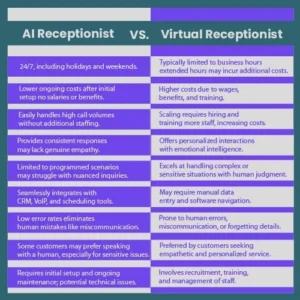Customer service will either help you succeed in the business world or destroy you in the world of fast-paced small business. Each call is essential, each question should be answered within a decent time, and each contact that was not addressed is possibly a lost deal. Here, the support of reception is important. However, the history of the solid front desk was about to change in recent days and now, several small companies have the option of either adopting an AI-based front desk or a virtual human receptionist.
Which is better then when it comes to your business? Let us divide the merits, demerits and optimal applications of both in order to help you make a better choice.
What Is an AI Receptionist?
An AI receptionist is a computerised response to the problem of having to answer the phone, respond to the questions, make appointments, and transfer calls without the operators of any sort. These options frequently carry the ability to use natural language processing (NLP) and machine learning, i.e., feature the capacity to comprehend and react to voice instructions with growing feverishness.
Such cases are endorsed by phone robot assistants, AI chatbots, and augmented to integrated voice response (IVR) systems.
What Is a Virtual Receptionist?
A virtual receptionist, however, is a human being working out of place who picks up your phone and does receptionist tasks on behalf of your business. These are professionals that are usually trained and are conversant with the art of customer service, their tone and etiquette in the business world. Virtual receptionists are normally outsourced by the agencies or specialist providers.
A comparison of the two: pros and cons
1. Cost
• AI Receptionists: In most instances, they are less expensive. Every AI system requires a setup charge or membership fee; once paid, a large number of interactions can be processed without any expenses.
• Virtual Receptionists: Normally charged per minute or on a monthly package with some specified number of calls. They might prove to be expensive at times of heavy call submissions or when you need them to have more time.
Winner: AI, on the low end of small businesses.
2. Availability
• AI receptionists: Can be accessible 24/7, even on holidays and weekends and without any days off or sicknesses.
• Virtual Receptionists: Cannot be active 24/7 unless you are willing to pay extra money.
Winner: AI, because it supports the non-stop.
3. Individualisation & Personal Touch
• AI Receptionists: Although they have been enhanced over time, they are never capable of replacing the feeling of warmth, compassion, and the subtle levels of the human voice.
• Virtual Receptionists: Gives a human-like conversation. They are able to read the emotional signs, vary language and build rapport with the callers which is crucial among the representatives of service-based industries.
Winner: Virtual Receptionist, as a solution to businesses that care about a personal customer experience.
4. Scale and Performance
• AI Receptionists: These AI-based receptionists are able to take multiple calls simultaneously, give an immediate reply based on a database, and grow without the need to conduct further training or hire new people.
• Virtual Receptionists: An individual can only work on a single call at a given moment. To scale, one has to recruit additional workforce, it is associated with more coordination and expenditure.
Winner: AI, where the business must be expanded quickly or receive a large amount of calls.

5. Use of Accuracy and Consistency
• AI Receptionists: Remove the uncertainty of human error and give consistent messages – as long as they are well designed.
• Virtual Receptionists: They may be prone to some differences in performance, tone and accuracy as they get different training and are tired.
The winner: AI, because of the consistency of branding and delivery of messages.

Which One is Better?
When solving the problem of AI or virtual receptionists, your business priorities will choose the options:
Select AI Receptionist when:
- You are a new company, micro-business or operating on a low budget.
- You require 24-hour access at low prices.
- Your customer enquiries are straightforward and not complex (e.g., booking an appointment, FAQs).
- You do not want to scale up by bringing in new employees.
Use Virtual Receptionist when:
- You have a high-touch, personalised service business (e.g., law firms, therapists, customised services).
- Your callers want friendly and personal communication.
- Most of the time it requires complex call handling or emotional intelligence.
Best of both worlds: The Hybrid Solution
Most small businesses prefer a hybrid system to work. AI can automate mundane operations such as answering FAQs, call transfer, or even appointment setting. Next, move potentially tricky or sophisticated interactions to a virtual human receptionist.
This will enable you to minimise expenses without compromising the customer experience.
Final Thoughts
Both AI and virtual receptionists have strengths of their own. Scalability and cost savings, as well as the around-the-clock availability, are the benefits of AI; warmth, empathy, and human judgement are the features of a virtual receptionist. The greatest decision that many small businesses cannot afford to make is who to select between the two but to merge strategically.
The ultimate resolution is the one that best suits your brand, your clientele and your business model.


Leave A Comment